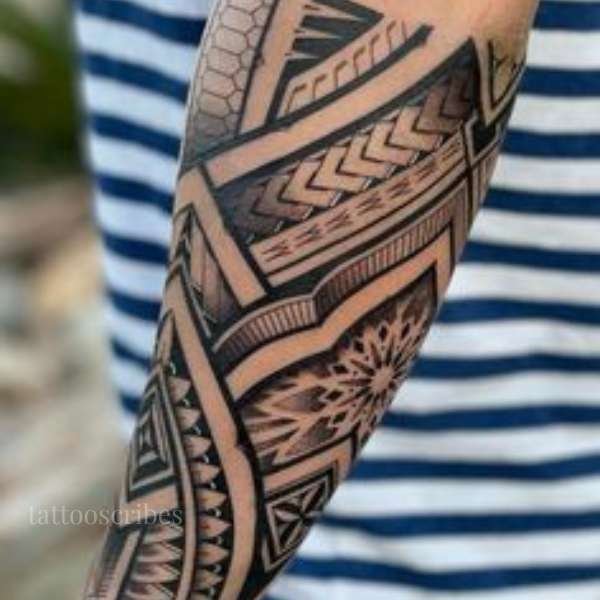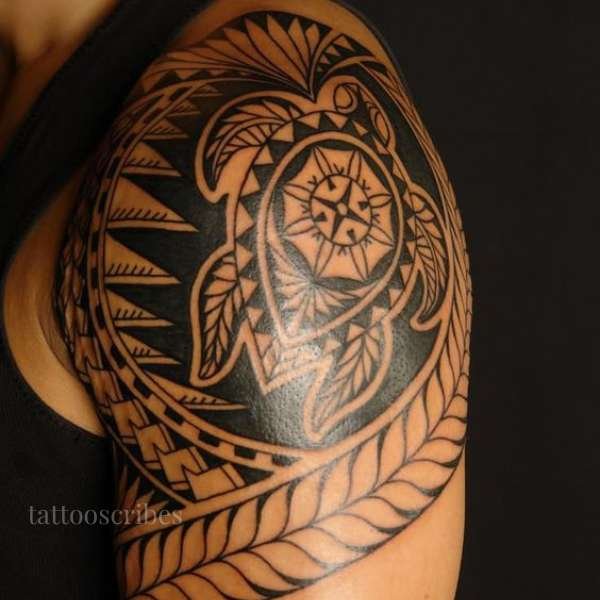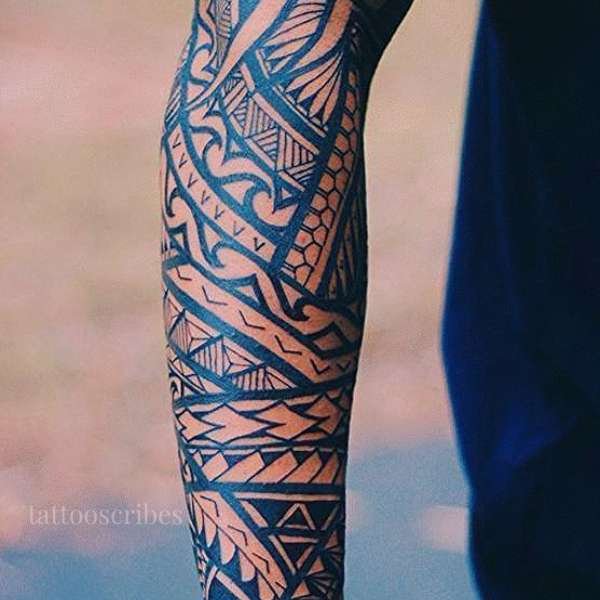Many people think Polynesian tribal tattoos are just decorative, but these designs symbolize strength with deep cultural meanings.
From protecting one’s spirit to honouring heritage, Polynesian tattoo designs are much more than ink on the skin. Choosing the right tattoo can remind you of your values and beliefs.
Discover how these mythical symbols can be a powerful form of self-expression.

What Does a Polynesian Tribal Tattoo Mean?
A Polynesian tribal tattoo meaning represents identity, courage, and spiritual protection. Every motif carries ancestral symbolism—honoring warriors, nature, and divine connection to one’s roots.
General Symbolism of Polynesian Tribal Tattoos
- Identity – Marks your lineage and cultural pride.
- Protection – Believed to shield you from harm and evil spirits.
- Courage – Honors warrior spirit and personal bravery.
- Spiritual Connection – Links you to ancestors and nature.
- Respect – Shows devotion to family, tribe, and community.

Cultural Meanings of Polynesian Tribal Tattoos
- Samoan Pe’a – Represents maturity, service, and strength within the community.
- Hawaiian Kakau – Embodies spiritual guidance and connection to the gods.
- Maori Ta Moko – Symbolizes genealogy, achievements, and identity.
- Tahitian Tattoos – Reflect rank, protection, and respect for ancestors.
- Marquesan Patterns – Express power, courage, and life balance through geometric design.
Polynesian Tribal Tattoo Variations and Designs
- Ocean Waves – Symbol of life’s journey and connection to the sea.
- Turtle (Honu) – Represents peace, longevity, and navigation.
- Spearheads – Strength, courage, and warrior spirit.
- Enata (Human Figures) – Connection to family and ancestors.
- Shark Teeth (Niho Mano) – Power, protection, and adaptability.
- Sun & Moon Motifs – Balance between light and darkness.

Color Variations of Polynesian Tribal Tattoo
- Black Ink – Traditional purity and timeless strength.
- Brown/Gray – Earthy tones symbolizing grounding and endurance.
Learn how to find the perfect artist here.
Other Symbolic Meanings of Polynesian Tribal Tattoos
- Honor and Duty – Reflects your commitment to family and culture.
- Transformation – Marks life milestones or personal rebirth.
- Resilience – Shows inner toughness against life’s challenges.
- Spiritual Awareness – Connection with nature’s energy and guidance.
- Legacy – Keeps ancestral stories alive through art.

Meaningful Placement Ideas
- Face (Traditional Ta Moko) – Genealogy, honor, and social status.
- Chest – Courage, leadership, and warrior spirit.
- Back – Protection and ancestral support.
- Arm/Shoulder – Strength and personal identity.
- Legs – Life journey, movement, and resilience.
You may also like below posts:
Get detailed aftercare tips here.
Other Polynesian Tribal Tattoo Variations

Polynesian Tribal Tattoo Meaning
A Polynesian Tribal Tattoo meaning celebrates heritage, strength, and personal identity. Each pattern and symbol tells a story, representing protection, courage, and important life milestones. These tattoos honor cultural roots while expressing individuality, making them powerful designs that connect you to tradition and showcase your personal journey in a bold, artistic way.
Polynesian Tribal Tattoo Meaning Family
A Polynesian tribal tattoo meaning family celebrates strong bonds, heritage, and loyalty. These intricate designs often tell a personal story, honoring ancestors and close relationships. Placed anywhere on the body, they serve as a powerful reminder of connection, protection, and the pride you carry in your family and cultural roots.
Polynesian Tribal Tattoo Meaning Strength
A Polynesian Tribal Tattoo meaning strength represents courage, resilience, and personal power. Rooted in Polynesian culture, these intricate designs tell stories of heritage, protection, and life’s battles. Wearing one symbolizes inner strength, determination, and pride in your roots, making it a bold and meaningful choice for anyone seeking empowerment.
Polynesian Tribal Tattoo Turtle Meaning
A Polynesian Tribal Tattoo turtle meaning symbolizes longevity, protection, and guidance. In Polynesian culture, turtles represent wisdom, patience, and a deep connection to the ocean. Tribal designs add cultural richness, making this tattoo a powerful reminder of resilience, family ties, and staying grounded while navigating life’s journey.
Polynesian Tribal Tattoo Symbol Meaning
A Polynesian Tribal Tattoo symbol meaning highlights identity, heritage, and personal strength. Each design carries deep cultural stories, like protection, courage, or family ties. Worn on the body, these intricate patterns honor tradition while expressing who you are, making it a powerful and meaningful choice for self-expression.
Polynesian Tribal Tattoo Pattern Meaning
A Polynesian Tribal Tattoo pattern meaning celebrates heritage, strength, and personal identity. Each pattern tells a story through symbols like waves, animals, and geometric shapes, representing protection, courage, and life journeys. These tattoos honor culture while showing your connection to ancestry, resilience, and the values that guide you.
Frequently Asked Questions
Are Polynesian tribal tattoos cultural appropriation?
Only if done without respect; always understand the symbols’ meaning first.
What is the main purpose of Polynesian tattoos?
They express heritage, achievements, and spiritual connection.
Do different islands have different tattoo meanings?
Yes, meanings vary among Samoan, Maori, Hawaiian, and Tahitian cultures.
Can non-Polynesians get tribal tattoos?
Yes, but ensure you understand the cultural significance and symbolism.
Why are most Polynesian tattoos black?
Black ink reflects tradition, purity, and the sacred bond with ancestors.
What do turtle designs mean in Polynesian tattoos?
They symbolize peace, longevity, and protection during life’s journey.
Final Verdict
Polynesian tribal tattoos are more than art—they’re stories etched in the skin, honouring heritage and personal journeys.
If this guide inspired you or helped deepen your understanding, share your thoughts in the comments! We’d love to hear your perspective. 🌺✨
